
Soil Conservationists play a critical role in maintaining soil health, which directly impacts agricultural productivity and ecosystem sustainability. Specific certifications ensure that these experts possess the knowledge and skills required to implement effective soil management practices and use advanced conservation tools. Certification also provides credibility, helping them to gain the trust of landowners and stakeholders involved in environmental projects. Here are some key certifications you may need as a Soil Conservationist.
Certified Professional Soil Scientist (CPSS)
A Certified Professional Soil Scientist (CPSS) possesses the expertise needed to accurately assess soil properties and conditions, critical for effective soil conservation strategies. Their specialized knowledge aids in identifying soil degradation causes, allowing for the development of tailored remedial solutions. CPSS professionals ensure that soil management practices align with ecological sustainability and agricultural productivity goals. Their scientific insights contribute to policy formulation, enhancing the long-term success of soil conservation efforts.
Certified Professional in Erosion and Sediment Control (CPESC)
Erosion and sediment control is crucial for maintaining soil health, and a CPESC certification equips professionals with the necessary knowledge and skills. Soil conservationists often face complex environmental challenges, and the CPESC credential indicates proficiency in implementing effective conservation techniques. Regulatory requirements increasingly demand expertise in erosion management, making the CPESC essential for compliance. Knowledge from CPESC ensures sustainable practices, minimizing land degradation and preserving natural resources.
Certified Crop Adviser (CCA)
Certified Crop Advisers provide the technical knowledge necessary to implement effective soil conservation practices, ensuring agricultural productivity while minimizing erosion. Their expertise in nutrient management helps optimize crop yields, which in turn reduces the need for chemical inputs that can harm soil health. They offer insights into sustainable farming practices that preserve soil structure and fertility over the long term. Through their guidance, soil conservationists can better develop strategies tailored to specific crop and soil types, enhancing the resilience of agricultural systems.
Certified Conservation Planner (CCP)
Certified Conservation Planners (CCPs) are essential for soil conservationists as they provide expert guidance on sustainable land use practices, helping to prevent soil erosion and degradation. With their specialized training, CCPs can evaluate land resources and develop tailored conservation plans that support ecological balance and productivity. Their expertise ensures compliance with environmental regulations, reducing potential legal risks for landowners. By working with diverse stakeholders, CCPs facilitate collaborative approaches to conservation, enhancing the effectiveness of soil preservation efforts.
Soil Health Professional Certification (SHPC)
The increasing complexity of soil science demands that soil conservationists possess up-to-date knowledge and specialized skills, which the Soil Health Professional Certification (SHPC) can validate. As regulations and best practices evolve, certified professionals can ensure compliance and implement effective soil management strategies. The certification aids in standardizing expertise, thus enhancing credibility and trust with stakeholders like farmers and governments. Adopting SHPC supports better communication and decision-making in cross-disciplinary teams involved in land management and agriculture.
Certified Environmental Professional (CEP)
Soil conservation involves complex ecological principles, and a Certified Environmental Professional (CEP) provides expertise in assessing environmental impacts accurately. CEP certification demonstrates a high standard of knowledge and skills, ensuring that soil management practices align with current environmental regulations. The CEP's technical proficiency in sustainable practices facilitates effective strategies to prevent soil erosion and degradation. Stakeholders often trust and collaborate more willingly with soil conservationists who hold recognized qualifications like the CEP, enhancing project credibility and community engagement.
Certified Natural Resources Manager (CNRM)
A Certified Natural Resources Manager (CNRM) possesses the expertise in sustainable resource management, which is crucial for effective soil conservation strategies. Soil conservationists rely on the knowledge of a CNRM to implement practices that reduce soil erosion and improve soil health. The certification ensures that natural resources are managed in a way that aligns with environmental regulations and best practices. CNRMs provide critical guidance in developing policies that mitigate the negative effects of human activities on soil ecosystems.
Watershed Restoration Specialist (WRS)
A Watershed Restoration Specialist focuses on repairing and maintaining natural water systems, which directly affects soil health by reducing erosion and improving nutrient retention. Soil conservation benefits from WRS expertise as they implement sustainable land management practices that stabilize landscapes and prevent degradation. Effective watershed management improves water quality, which supports soil fertility and promotes agricultural productivity. Collaboration between WRS and soil conservationists enhances ecosystem resilience, ensuring long-term sustainability and resource preservation.
Certified Sustainable Agriculture Specialist (CSAS)
The role of a Certified Sustainable Agriculture Specialist (CSAS) provides essential expertise in implementing sustainable farming practices, directly benefiting soil health and conservation efforts. Their knowledge aids in preventing soil erosion, preserving organic matter, and maintaining nutrient cycles, which are critical for soil conservation. By promoting sustainable techniques, a CSAS helps mitigate negative environmental impacts such as soil degradation and loss of biodiversity. This specialized skill set supports soil conservationists in creating more resilient and productive agricultural systems.
LEED Green Associate (LEED GA)
A Soil Conservationist with a LEED Green Associate credential better understands sustainable land management practices involved in green building projects. This knowledge enables them to contribute effectively to projects requiring sustainable soil management, reducing erosion and promoting land restoration. LEED GA expertise helps in assessing the environmental impact of construction on soil and implementing designs that minimize these effects. Awareness of LEED standards also ensures collaboration with other professionals to integrate soil conservation into broader sustainability goals.
Summary
When you obtain certifications as a Soil Conservationist, your expertise in sustainable land management becomes more credible. Employers may view your qualifications favorably, leading to increased job prospects and potential career advancement. The certifications can enhance your knowledge base, making it easier to implement effective soil preservation strategies. The agricultural community might seek your guidance more frequently, benefiting from your certified skills in soil health improvement.
